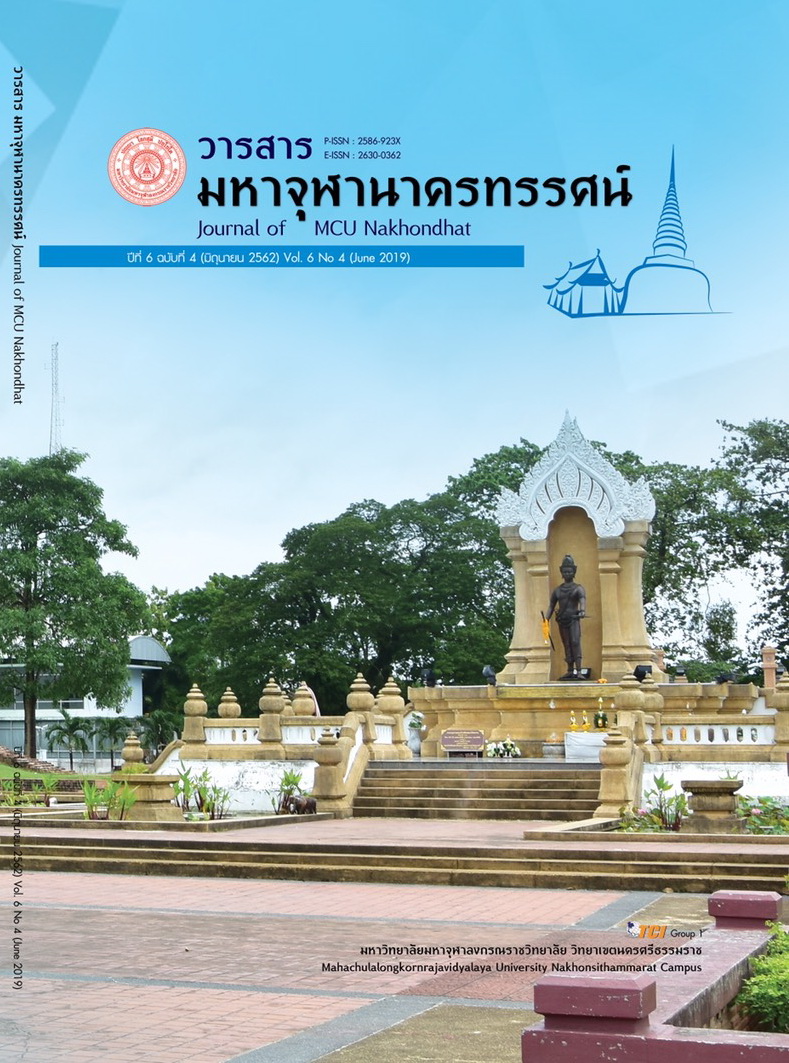AN APPLICATION OF SÃRÃNĨYADHAMMA IN THE PARTICIPATION OF BANCHONG COMMUNITY, CHONG DISTRICT, NAYONG DISTRICT, TRANG PROVINCE
Main Article Content
Abstract
The purposes of this research were: 1) to study the principle of Sàràniyadhamma (states of conciliation) in Theravada Buddhism; 2) to investigate the participation of Banchong community, Chong District, Nayong District, Trang Province, and 3) to propose a guideline for the application of the principle of Sàràniyadhamma in the participatory activity of Banchong community, Chong District, Nayong District, Trang Province. The study was conducted by employing the Qualitative Research, in which data were gathered from In-Depth-interview and Focus group discussion. The
findings were as follows:
The principle of Sàràniyadhamma in the Theravada Buddhist Scripture is the dhamma principle taught by the Buddha as the cause of remembrance, respect, harmonization, peace without quarrel. The principle of Sàràniyadhamma can be divided into four aspects; the first aspect includes thought, speech, and act based kindness, which is from three principles of Sàràniyadhamma , Mettàkàyakamma (amiable in deed openly and in private), Mettàvacikamma (amiable in deed, openly and in private), Mettàmanokamma (amiable in thought, openly and in private); the second aspect dealing with the community participation, in which each and every one helps each other is relevant to the principle ‘Sàdhàranabhogità’ (to share any lawful gains with virtuous fellows); the third aspect dealing with the community’s participation ‘ behaving oneself in the same and equal rule’ is accorded with the Sàràniyadhamma principle ‘Sãlasàmannatà’ (to keep without blemish the rules of conduct along with one’s fellows, openly and in private); the fourth aspect dealing with the community’s participation ‘an adjustment of one’s disagreement’ is related to the Sàràniyadhamma principle ‘Ditthisàmannatà’ (to be endowed with right view along with one’s fellows, openly and in private).
In the participation of Banchong community, Chong District, Nayong District, Trang Province, it was concluded that participation is people have involved in various public activities or projects initiated by the community as people in the community realize the importance of participation. Such as temple, school development and watershed forest conservation projects etc. Also, they are aware of the problems and needs of their own community very well.
The application of the principle of Sàràniyadhamma in the community’s participation starts with a family, the social institution, that helps social members learn the rules of society, imparting culture to new born members to learn the patterns and practices of social order. Religious institution serves the spiritual needs, encouraging members in religious societies to adopt and follow their religious teachings, especially religious leaders, who are a link or mediator between the people in the community and the religion. The leader of the Sangha is a person who plays a great role in propagating the doctrine of the Lord Buddha to the members of the community to get involved with the temple or organization via the way of propagation.
Article Details
References
พระครูนนทวีรวัฒน์ วีรธมฺโม (มีนุสรณ์). (2553). “การบริหารงานเทศบาลตําบลตามหลักสาราณียธรรม 6 : กรณีศึกษาเทศบาลตำบลปลายบาง อำเภอบางกรวย จังหวัดนนทบุรี”. ใน วิทยานิพนธ์พุทธศาสตรมหาบัณฑิต สาขาการจัดการเชิงพุทธ . มหาวิทยาลัยมหาจุฬาลงกรณราชวิทยาลัย.
พระบรมราโชวาทและพระราชดำรัส. (2561). “การครองตน” ณ สีหบัญชร พระที่นั่ง อนันตสมาคม [ออนไลน์]. เรียกใช้เมื่อ 15 พฤศจิกายน 2561 จาก https://www.ocsc.go.th/sites/default/files/ attachment/ page/krongton .pdf
พระพรหมคุณาภรณ์ (ป.อ. ปยุตโต). (2551). พจนานุกรมพุทธศาสตร์ ฉบับประมวลธรรม . (พิมพ์ครั้งที่ 16). กรุงเทพมหานคร: เอส.อาร์. พริ้นติ้ง แมส โปรดักส์ จำกัด.
พระพรหมคุณาภรณ์ (ป.อ. ปยุตโต). (2547). ธรรมนูญชีวิต . (พิมพ์ครั้งที่ 30). กรุงเทพมหานคร: บริษัทสหธรรมิก จำกัด.
พระมหาชัย จารุวณฺโณ. (1 พฤศจิกายน 2561). แนวทางการประยุกต์ใช้หลักสาราณียธรรมในการมีส่วนร่วมของชุมชน. (พระสมุห์อมร อมโร (สีดำ), ผู้สัมภาษณ์)
มหาจุฬาลงกรณราชวิทยาลัย. (2539). พระไตรปิฎกภาษาไทยฉบับมหาจุฬาลงกรณราชวิทยาลัย. กรุงเทพมหานคร: โรงพิมพ์มหาจุฬาลงกรณราชวิทยาลัย.
สมลักษณา ไชยเสริฐ. (2549). การพัฒนารูปแบบการมีส่วนร่วมของประชาชนใน คณะกรรมการตรวจสอบและติดตามการบริหารงานตำรวจสถานีตำรวจนครบาล. ใน วิทยานิพนธ์รัฐประศาสนศาสตรมหาบัณฑิต สาขาวิชารัฐประศาสนศาสตร์. จุฬาลงกรณ์มหาวิทยาลัย.

